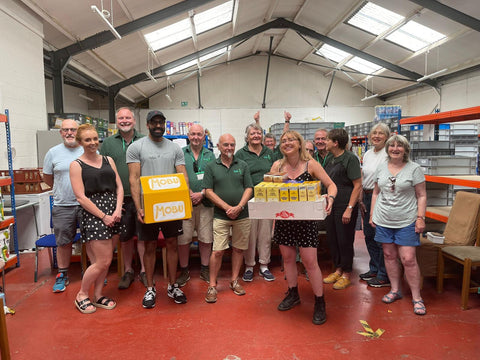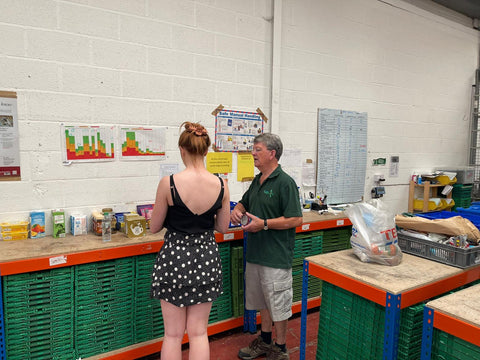
· By Tilly Bishop
Our experience at Worcester Food Bank
Last month, myself, Katy and Mo visited our local food bank in Worcester, to further educate ourselves on the importance of food banks, and to showcase their incredibly hard work. We caught up with the lovely volunteers at the Trussell Trust to learn more about how food banks operate and to showcase the incredible work that they do to help people struggling in the community.
We were given the opportunity to see a food bank first hand, to ask questions, and the chance to donate our own food goods to the trust.
It was a truly enlightening experience, and it was humbling to meet such a fantastic group of selfless volunteers who work hard on a weekly basis to ensure that people are given the correct amount of food.

So how exactly do food banks actually work?
Food banks accept a wide variety of donations from the residential community, organisations, supermarkets, charities and even mass food producers in the local area. Food banks essentially run on a date-rotation system. Food banks accept donations of food with a long shelf life. Generally, the food is preserved in plastic or aluminium packaging, with a prolonged use by date on it. Largely, this is in the form of tinned goods, packaged non-perishables, and dried food. Think tinned potatoes, pot noodles, dry spaghetti. Things like beans, pasta, and packaged sauces and soups or dry cereals are great food bank options. The foods are separated into their various categories, and are segmented into the correct ‘use by’ dates. The shorter use by dates are placed at a higher priority, so that longer shelf lives are rotated, and used as a last priority.
Once they’ve been categorised, food parcels and packages are made up depending on how many people require the service. Clients sign up to the service, and can receive a weekly parcel depending on their demand for service. The volunteers will then place all necessary food items into recyclable paper bags, and the food is sent out using in-house delivery drivers who go off into the community to drop off the parcels.
The importance of food banks
Food banks provide fantastic support and food resources for a wide variety of people who are living in poverty and facing starvation. No human being should go hungry, and food banks seek to ensure that those struggling are still managing to receive basic nutrition. The UK’s incredible network of food banks provide food to those who need it most, and to those in crises.
Sadly, last year the Trussell Trust saw a 33% increase in the number of emergency food parcels that had to be given out to people in crises. They fed approximately 2,173,158 between 2021/22.

Donate!
The Trussell Trust accept both monetary donations and food donations. Find out how you can donate!
There's loads of ways you can get involved, like
- Challenging yourself to live on a food bank parcel for three days
- Raising money by doing fundraising events
- Offering time to help pack parcels on a weekly basis
- Giving monetary donations
- Donating food goods after completing your weekly supermarket shop (many supermarkets often have boxes at the exit where shoppers can deposit canned goods for collection)
Over the last few weeks, the team at MOBU have been slowly collecting food goods. We managed to weigh in our mustard yellow (of course) cardboard box at 12.35kg - but we will definitely be making regular donations in the coming future months.
A big thank you to all the amazing volunteers at the Trussell Trust for having us!